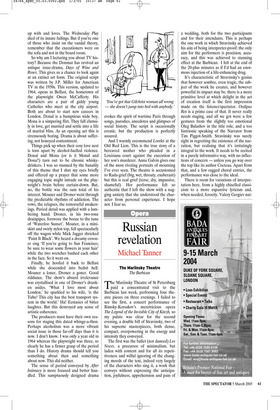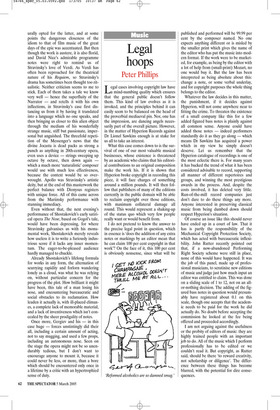Russian revelation
Michael Tanner
The Mariinsky Theatre The Barbican The Mariinsky Theatre of St Petersburg paid a concentrated visit to the Barbican last week, performing four theatre pieces on three evenings. I failed to see the first, a concert performance of Rimsky-Korsakov’s meretricious opera The Legend of the Invisible City of Kitezh, so my palate was clear for the second evening, a double bill of Stravinsky, two of his supreme masterpieces, both dense, compact, overpowering in the energy and intensity they conveyed.
The first was the ballet (not danced) Les Noces, a precursor of minimalism, but laden with content and for all its repetitiveness and wilful ignoring of the changing moods of the text, indeed very largely of the characters who sing it, a work that conveys without expressing the anticipation, joyfulness, apprehension and pain of a wedding, both for the two participants and for their attendants. This is perhaps the one work in which Stravinsky achieved his aim of being interpreter-proof: the only aim for the performers is precision, accuracy, and this was achieved to stunning effect at the Barbican. I felt at the end of the 20-plus minutes as if I’d had an enormous injection of a life-enhancing drug.
It’s characteristic of Stravinsky’s genius that however sombre, even tragic, the subject of the work he creates, and however powerful its impact may be, there is a more primitive level at which delight in the act of creation itself is the first impression made on the listener/spectator. Oedipus Rex is a prime case of that. It never really needs staging, and all we got were a few gestures from the slightly too emotional Oleg Balashov in the title role, and a too histrionic speaking of the Narrator from Tim Piggot-Smith. Stravinsky was surely right in regretting the existence of the narration, but realising that it’s irritatingly integral to the work. It needs to be recited in a purely informative way, with no inflections of concern — unless you go way over the top like its author Cocteau. Apart from that, and a few ragged choral entries, the performance was close to the ideal.
There is room for variations of interpretation here, from a highly chiselled classicism to a more expansive lyricism and, when needed, ferocity. Valery Gergiev nat urally opted for the latter, and at some points the dangerous closeness of the idiom to that of film music of the great days of the epic was accentuated. But then though the work is austere, it is also florid, and David Nice’s admirable programme notes were right to remind us of Stravinsky’s love of Verdi. As Verdi has often been reproached for the theatrical nature of his Requiem, so Stravinsky’s drama has sometimes been thought too ritualistic. Neither criticism seems to me to stick. Each of them takes a tale we know very well — hence the superfluity of the Narrator — and retells it with his own inflections, in Stravinsky’s case first distancing us from it by having it translated into a language which no one speaks, and then bringing us closer to this alien object through the medium of his wonderfully strange music, stiff but passionate, impersonal but anguished. The threefold repetition of the Messenger’s news that the divine Jocasta is dead packs as strong a punch as anything in 20th-century opera, even uses a device — strings sweeping up octave by octave, then down again which a much more ‘naturalistic’ composer would use with much less effectiveness, because the context would be so overwrought. Apollo was Stravinsky’s artistic deity, but at the end of this masterwork the perfect balance with Dionysus registers with unique force. All of this came across from the Mariinsky performance with stunning immediacy.
Even without that, the next evening’s performance of Shostakovich’s early satirical opera The Nose, based on Gogol’s tale, would have been depressing, for where Stravinsky galvanises us with his monumental work, Shostakovich merely reveals how useless it is to write a furiously industrious score if it lacks any inner momentum. The eager-to-be-pleased audience hardly managed to chuckle.
Already Shostakovich’s lifelong formula for works in any form, the alternation of scurrying rapidity and forlorn wandering lonely as a cloud, was what he was relying on, without particular concern for the progress of the plot. How brilliant it might have been, this tale of a man losing his nose, and encountering bureaucratic and social obstacles to its reclamation. How leaden it actually is, with ill-placed climaxes, a complete lack of memorable material, and a lack of inventiveness which isn’t concealed by the sheer prodigality of notes.
Once more, Gergiev and his — in this case huge — forces unstintingly did their all, including a certain amount of acting, not to say mugging, and used a few props, including an autonomous nose. Seen on the stage the opera might not be so unendurably tedious, but I don’t want to encourage anyone to mount it, because it could never be less, or more, than a bore which should be encountered only once in a lifetime by a critic with an hypertrophied sense of duty.



























































 Previous page
Previous page